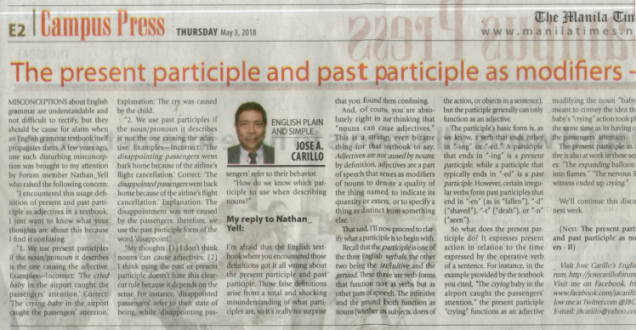WHAT'S THE CORRECT BASIS FOR CHOOSING BETWEEN
PRESENT PARTICIPLES AND PAST PARTICIPLES?
Misconceptions about English grammar are understandable and not difficult to rectify, but they should be cause for alarm when an English grammar textbook itself propagates them. A few years ago, one such disturbing misconception was brought to my attention by Forum member Nathan_Yell who raised the following concern:
“I encountered this usage definition of present and past participle as adjectives in a textbook. I just want to know what your thoughts are about this because I find it confusing.
“1. We use present participles if the noun/pronoun it describes is the one causing the adjective. Examples—Incorrect: ‘The
cried baby in the airport caught the passengers’ attention.’ Correct: ‘The
crying baby in the airport caught the passengers' attention.’ Explanation: The cry was caused by the child.
“2. We use past participles if the noun/pronoun it describes is not the one causing the adjective. Examples—Incorrect: ‘The
disappointing passengers went back home because of the airline’s flight cancellation.’ Correct: ‘The
disappointed passengers went back home because of the airline’s flight cancellation.’ Explanation: The disappointment was not caused by the passengers; therefore, we use the past participle form of the word ‘disappoint.’
“My thoughts: (1) I don’t think nouns can
cause adjectives; (2) I think using the past or present participle doesn’t have this clear-cut rule because it depends on the sense. For instance, ‘disappointed passengers’ refer to their state of being, while ‘disappointing passengers’ refer to their behavior.
“How do we know which participle to use when describing nouns?”
My reply to Nathan_Yell:I’m afraid that the English textbook where you encountered those definitions got it all wrong about the present participle and past participle. Those false definitions arise from a total and shocking misunderstanding of what participles are, so it’s really no surprise that you found them confusing.
And, of course, you are absolutely right in
not thinking that “nouns can cause adjectives.” This is a strange, even bizarre thing for that textbook to say.
Adjectives are not caused by nouns; by definition, adjectives are a part of speech that serves as modifiers of nouns to denote a quality of the thing named, to indicate its quantity or extent, or to specify a thing as distinct from something else.
That said, I’ll now proceed to clarify what a participle is to begin with.
Recall that the participle is one of
the three English verbals, the other two being the infinitive and the gerund. These three are verb forms that function not as verbs but as other parts of speech. T
he infinitive and the gerund both function as nouns (whether as subjects, doers of the action, or objects in a sentence), but
the participle generally can only function as an adjective.
The participle’s basic form is, as we know, a verb that ends either in “-ing” or “-ed.” A participle that ends in “-ing” is a
present participle, while a participle that typically ends in “-ed” is a
past participle. However, certain irregular verbs form past participles that end in “-en” (as in “fallen”), “-d” (“shaved”), “-t” (“dealt”), or “-n” (“seen”).
So what does the present participle do? It expresses present action in relation to the time expressed by the operative verb of a sentence. For instance, in the example provided by the textbook you cited, “The
crying baby in the airport caught the passengers’ attention,” the present participle “crying” functions as an adjective modifying the noun “baby.” It’s meant to convey the idea that the baby’s “crying” action took place at the same time as its having caught the passengers’ attention.
The present participle as adjective is also at work in these sentences: “The
expanding balloon burst into flames.” “The nervous Senate witness ended up
crying.”
We’ll continue this discussion next week.
 This essay appeared in the column “English Plain and Simple” by Jose A. Carillo in the Campus Press section of the May 3, 2018 issue (print edition only) of
This essay appeared in the column “English Plain and Simple” by Jose A. Carillo in the Campus Press section of the May 3, 2018 issue (print edition only) of The Manila Times
, © 2018 by the Manila Times Publishing Corp. All rights reserved.(Next:
The present participle and past participle as modifiers - II) May 10, 2018